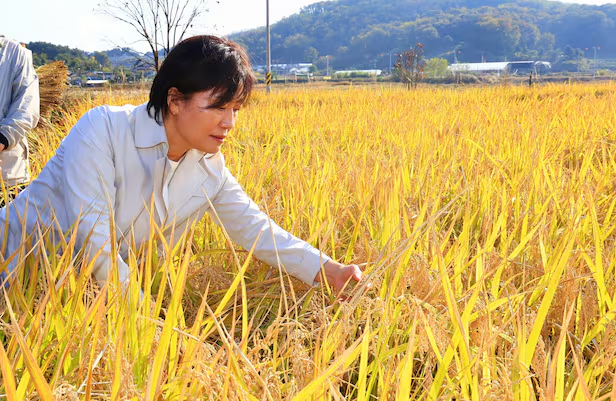Tags
Korea cuts rice cultivation, boosts organic production and exports.
Government pushes for rice industry overhaul amidst growing organic focus.
By Yun Hee-hun

The government is planning to reduce rice cultivation area by 80,000 hectares (ha, 1 ha is 10,000 square meters) to prevent overproduction of rice. This area is about 300 times the size of Yeouido. The reduction will be allocated based on the proportion of rice production in each local government area. The government plans to provide incentives, such as purchasing government-reserved rice, only to farms that participate in the reduction.
The Ministry of Agriculture, Food, and Rural Affairs announced on the 12th the ‘Rice Industry Structural Reform Plan’ (2025-2029) containing these details.
As rice consumption has drastically decreased due to low birthrates, aging population, and changing eating habits, the government has purchased rice 12 times since 2005. These measures were aimed at stabilizing rice prices, but the structural overproduction system remains unchanged because the decrease in rice production is smaller than the decrease in consumption. This oversupply issue is causing a drop in rice prices, leading to a decline in farm profitability.
In response, the government has decided to introduce a rice cultivation area adjustment system starting next year. Previously, it encouraged the switch by providing additional incentives such as strategic crop direct payments to farms growing crops other than rice. However, as this proved ineffective, the government is now more actively pursuing a reduction in cultivation areas.
The Ministry of Agriculture and Food will provide incentives (benefits) such as purchasing government-reserved rice to farms that reduce rice cultivation areas, while those not participating in the adjustment will be excluded from purchasing government-reserved rice.
The budget for the ‘Strategic Crops Direct Payment System’ to support farms growing crops other than rice has been expanded from 186.5 billion won this year to 244 billion won next year. The payment per hectare for summer forage crops and wheat will be increased by 700,000 won and 500,000 won, respectively, next year.
The Agriculture and Food Ministry plans to reduce the rice cultivation area by 80,000 ha next year this way. The target reduction area is 11% of this year’s rice cultivation area (698,000 ha). It is 276 times the area of Yeouido (290 ha).
Support for rice production will prioritize quality over quantity. Next year, the government will conduct a pilot operation of a specialized complex in each province to enable farms to produce high-quality rice. Based on the pilot results, the government plans to expand to two locations per province by 2029.
The government will expand organic rice cultivation to 68,000 ha by 2029. The purchase price for government-reserved rice for organic rice will be higher.
If farms previously producing regular rice switch to producing organic rice, the government will purchase the entire production (up to 150,000 tons).
To improve the production and distribution of high-quality rice, the rice labeling system will be revised. Displaying protein content will become mandatory, and the standards for rice grading will be strengthened.
The promotion of rice consumption will also be pursued. The government will support the production and consumption of traditional liquor, which uses a lot of rice. Starting next year, the liquor tax reduction range for traditional liquor will be expanded, and the criteria for main ingredients in regional specialty liquors will be relaxed.
Food companies that use private new grain instead of government rice will get preferential treatment in policy funding support.
The government also aims to expand the export of rice and processed rice products. The export target for processed rice products is set to increase from 100,000 tons this year to 180,000 tons by 2029. To achieve this, the government plans to establish promotional centers in major export countries and expand online business-to-business (B2B) sales platforms.
The government will increase rice food aid from 110,000 tons this year to 160,000 tons next year.
While the Agriculture and Food Ministry plans to pursue rice reduction with these policies, there is skepticism about its feasibility as the opposition-led amendment to the ‘Grain Management Act,’ which requires the purchase of all overproduced rice, has passed a plenary session in the National Assembly.
Choe Myeong-cheol, Director General of Agricultural Policy at the Ministry of Agriculture, Food, and Rural Affairs, noted, “Since reforming rice policy in 2005, the government has consistently pursued market-oriented policies, and the rice act led by the opposition distorts the market. Market-centered approaches are desirable for the country.” He added, “Efforts will be made to encourage participation from local governments and farmers, such as holding local briefing sessions.”
https://biz.chosun.com/en/en-policy/2024/12/12/LNG7QDYORFBMZNT3FSBVO46DQU/Published Date: December 12, 2024






